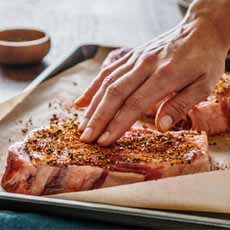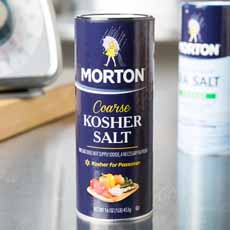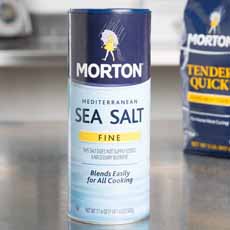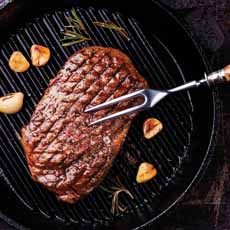
[1] Blending salt with spices before salting a steak (first four photos courtesy Morton).

[2] Patting the blend onto the steak.

[3] Morton Coarse Kosher Salt.

[4] Morton Fine Sea Salt.

[5] Grilling to perfection (photo courtesy Aldi).
|
|
Most people are not aware that the type of salt used when cooking can make all the difference to the food.
For instance, did you know that kosher salt seasons more evenly, and sea salt melts more slowly?
Here are some tips and tricks from the undeniable salt expert, Morton Salt.
SALT PAIRING GUIDE
Meat
When grilling beef, lamb, or chicken, salting 24 hours in advance enhances the juiciness of the meat noticeably.
Season with kosher salt in the amount of .75% weight of the meat (1 teaspoon per pound). For fattier cuts of meat, use salt in amount of 1% weight of the meat.
Fish
Do not marinate before grilling, as it can make the fish fall apart on the grill. Instead, start by grilling fish with a light brush of oil. Then, apply the marinade at the last minute for a brush of flavor.
Alternatively, if you are keeping the seasonings simple with salt and pepper, season with coarse sea salt and freshly cracked pepper on the cooked side, when you first flip the fish. Repeat with the other side.
Coarse sea salt melts slower and deepens the flavor of fish. More mellow compared to the taste of kosher salt or fine sea salt, coarse sea salt is perfect for enhancing the flavor of a fish that does not have much additional seasoning.
Vegetables
Give vegetables a light, even shower of kosher salt at least 30 minutes in advance, along with some freshly cracked pepper. Season as liberally as you would with meat.
The most important thing is that the vegetables are seasoned evenly. Right before putting them on the grill, lightly brush the vegetables with oil. Without sufficient oil and salt, they will have less interaction with the fire, and will be less flavorful.
SEASONING 101: GRILLING WITH SALT
More tips for grilling:
Kosher Salt vs. Sea Salt: Kosher salt seasons evenly because of its unique crystal structure. Its flakiness allows it to evenly disperse when sprinkled. Coarse sea salt has a bit more complexity to the flavor, and because it melts slowly, it is perfect to use as a finishing salt.
Table Salt: For grilling, table salt is best used in marinades and dressings, or added to food at the table.
Pork: Do not salt in advance; it dries out the meat. Instead, grill the meat as you would, then finish it with coarse sea salt in .5% weight of the meat (about 1/3 teaspoon per pound). When the meat is fattier, season more generously than a lean cut of meat.
Vegetables: Be sure the grill grates are clean and well oiled. The veggies won’t stick, and they’ll get beautiful grill marks.
Pre-Cooking Vegetables: Use water salted with table salt to pre-cook hearty veggies such as carrots or potatoes, for 5 minutes before putting them on the grill. It will shorten the cooking time, and prevent burning from being on the grill too long in order to cook them through.
Fish: Blot the flesh with a paper towel to remove surface moisture before oiling.
Sturdy Vs. Delicate Fish: Fish such as swordfish, tuna, or salmon can be grilled directly on the grates, but delicate fish such as tilapia or flounder should be cooked in a foil.
THE DIFFERENT TYPES OF SALT
Check out more than 70 types of culinary salt. It’s a real eye opener!
|
You’ll also find interesting terms like selmelier: a trained professional specializing in culinary salt and its use in cooking and restaurant service.
The term is used as an analog to sommelier, the wine expert who makes recommendations. A selmelier can consult with chefs on the best pairings of foods and salts. Some restaurants even offer diners a choice of salts, with pairing recommendations from the selmelier.
The term was coined by food writer Mark Bitterman, who authored the book Salted and three other books on cooking with salt.
He has a blog, Salt News, which features more recipes.
|




